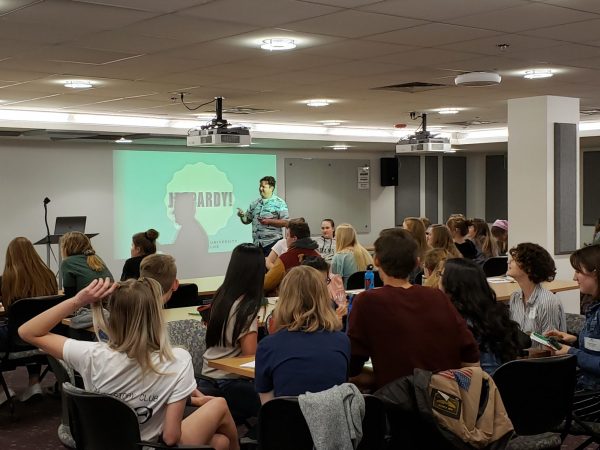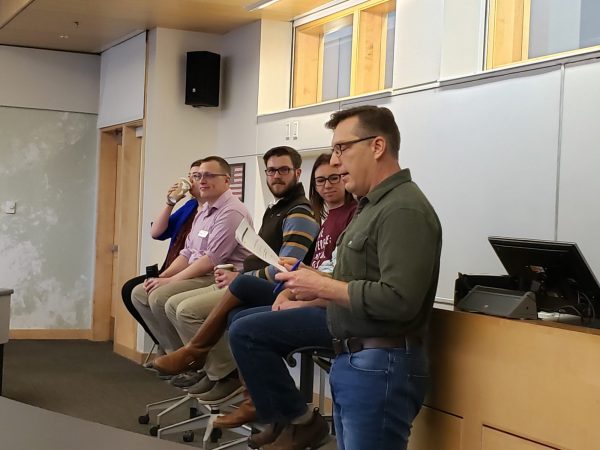History Day 2020: Connecting college, career with CSU alumni
On March 6th, the Public Lands History Center welcomed forty high school students from Rocky Mountain High School (RMHS) and Berthoud High School (BHS) to campus for History Day, a collaborative program that raises awareness of the history major and career options for historians. In 2018 PLHC Program Manager, Ariel Schnee, and RMHS teacher, Kurt Kneirim, developed History Day at the PLHC’s field workshop, Parks as Portals to Learning.
The decline in history majors since the 2008 financial crisis is well documented. The impacts have been profound at colleges and universities across the nation. Schnee and Kneirim noted that students lacked an awareness of the full scope of careers available to them until well into graduate school. But what would happen, they wondered, if they exposed students to all their options roughly eight to ten years earlier than normal?
Raising awareness of career paths less traveled
One of the key problems with recruitment to the history major is that the better-known career paths, such as museums and tenure track academic positions have stabilized since 2008, but are still shrinking. Meanwhile, fields like Cultural Resource Management and Historic Preservation are growing. Communities and local governments need these types of positions to assist with their urban planning strategies, as well as heritage tourism initiatives. Some of this work is the result of federally-mandated historical research and surveys associated with the National Historic Preservation Act (NHPA) and the National Environmental Protection Act (NEPA). Furthermore, the generation occupying these fields’ top jobs is poised for retirement. Consultancies and public agencies alike are finding it difficult to fill positions with qualified candidates.
These fields’ technicality and relative obscurity leads many students and parents to think that majoring in history either means unemployment, or working in jobs that have nothing to do with their training. Thanks to efforts from the PLHC and its partners, such as Erika Pepmeyer and her staff at the College of Liberal Arts Office of Recruitment, as well as local teachers, students got to experience a full day in the life of a CSU Ram, complete with class visits, campus tour, lunch at a dining hall with current Rams, and even played a session of history Jeopardy, hosted by Phi Alpha Theta and the CSU History Club.

CSU Historians’ versatile toolkits
The day started with a career panel. Panelists spoke on their lives and paths outside of academia, and students learned what former History majors went on to do with their degrees after graduation. Moderated by Kurt Kneierim (CSU ’11), the panel represented a range of career paths, from Architectural Historian with Pinyon Environmental Inc., Poppie Gullett (CSU ’17) to Lead Content Marketing Specialist at Madwire, Sam Iven (CSU ’17).
Others went into public service, like Historic Preservation Planner for the City of Fort Collins, Jim Bertolini (CSU ’11). Teacher at Berthoud High School, Kayla Steele (CSU ’12) also participated, telling students about her path towards secondary education instruction—a route she said she never thought she’d take. Some of the panelists’ careers even led them back to CSU. Teaching Faculty member, Dr. Adam Thomas (CSU ’01), found his way back into academia after a stint in various careers, eventually finding a role at CSU that allowed him to function as an entrepreneur and as an educator.
Reflecting on CSU’s lasting educational and career impacts

At times, the panelists waxed poetic about the power of the historical discipline, and about the institution that had shaped them at key points in their education. Later, the panelists turned humorous, recalling specific teachers that had attracted them to history through their eccentricities and storytelling skills. Thomas wryly recalled being interrogated by his family about his career plans in history—What are you going to do, they asked him, open a history store? In response, he joked, he founded Historitecture, a bona fide “History Store.” As lead consultant and founder, he assists clients with documenting and surveying historic buildings and resources.
All the panelists took different routes to their current professions. However, they agreed that the skills they had acquired at CSU were decisive in building the competencies in writing, research, and problem-solving that they rely on in their careers. They also agreed that it was the professors and teachers at CSU that had been the most influential in shaping them, both as professionals and occasionally also as people.
Looking to ahead to future History Days
Programs like History Day are part of the PLHC’s mission of engaging students in history and building partnerships that reach beyond the typical scope of academia—extending to federal, state and local agencies as well as into the community by engaging with students and teachers at all levels. The PLHC hopes to continue to expand this collaborative program to include additional schools in the future.
If you are a Colorado high school educator interested in participating in History Day 2021, contact Ariel Schnee, at ariel.schnee@colostate.edu to learn how to your students can join our next session.